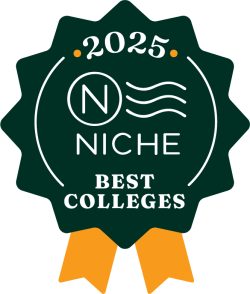Pursue a Bachelor’s Degree in Mathematics and Become a Valuable Asset to Employers
Do you want to incorporate your knowledge and interest in mathematics into a degree program that supports your career goals? The language of our universe is written in mathematics. Perhaps you’re interested in engineering, statistics, medicine, law, finance, or teaching. Our Bachelor of Science in Mathematics can help!
Whether you’re tasked with the problem of modeling water flow or modeling the spread of wildfires, the applications of mathematics are far-ranging and integral to many daily tasks. At Liberty, you can receive a quality education at an affordable price. Liberty offers a unique and rich student experience so that you can become well-rounded and ever-ready to impact the world for Christ.
Studying math can help open up a world of possibilities in numerous professions and math-related careers. We understand that you are probably passionate about logic, reason, predictions, and data interpretation, so we want to partner with you. Whether you decide to pursue a career in industry or pursue further graduate study, Liberty University can help prepare you for a future in mathematics. Take advantage of our bachelor’s in mathematics degree and learn the analytical, problem-solving, reasoning, and communications skills you need to be an asset in any career field you choose.
Award-Winning Campus
At Liberty, you’ll find an affordable, high-quality education that equips students like you for the real world. Our commitment to excellence helped us rank among Niche.com’s Top 3 college campuses in America. Earning your degree from a nonprofit university with state-of-the-art resources like ours can help set you apart from your peers.

Why Choose Liberty’s Mathematics Bachelor’s Degree?
At Liberty, we strive to provide you with a well-rounded education. We want you to be prepared for success in whatever field you choose — including engineering, statistics, teaching, finance, and more. Schools and businesses seek out our graduates because they are familiar with the rigorous standards of our program. By completing a mathematics degree at Liberty, you can be prepared to enter a career field that is both exciting and fulfilling.
We are a teaching university. This means that our professors, who are highly trained and have years of experience working with mathematics and in related fields, are in the classroom with you every week. They desire to mentor and support you while you pursue your mathematics degree. Many of our faculty members are interested in partnering with students to complete mathematical research, pray, and provide assistance throughout their degrees.
Our professors not only care deeply about your success in the mathematics industry, but they are also experts in the field of mathematics. With advanced degrees in mathematics and related fields, you can be confident that you are receiving a world-class education.
What Will You Learn in Our Mathematics Degree?
You can be well-equipped to pursue a career field related to mathematics after completing your bachelor’s degree. Our mathematics bachelor’s degree combines training in pure (theory and abstract) mathematics and applied (practical application) mathematics. Some of the foundational courses you’ll study include computer sciences, programming, technical communication, and physics. This allows you to have the foundation you need to succeed in your upper-level math courses as well as diversify your skill set.
As you progress in your degree, you will study subjects like calculus, geometry, statistics, linear algebra, and real analysis. In addition to these foundational courses, you have the option of choosing elective courses that best fit your individual interests and passions. Take a moment to review the Degree Completion Plan, and check out our featured courses below to learn more about what you’ll be studying!
What Degree Do You Need to Become a Mathematician?
Our Bachelor of Science in Mathematics can help prepare you for further graduate study. A master’s degree in mathematics can help you become suited for applied mathematician roles or teaching at the community college level — however, a PhD in Mathematics is most sought after by those who aim to be mathematicians.
Many who study mathematics at the undergraduate level go on to pursue their PhD directly after undergraduate study, but many also opt to pursue a master’s degree. In our mathematics courses, material for the GRE is taught, which is an admissions requirement at many universities for graduate study in mathematics. Specific admission requirements vary by institution.
With rigorous study of real analysis, complex analysis, differential equations, linear algebra, and calculus, you can begin to form a strong basis for further study. With professors that you can form meaningful relationships with, you can define your goals and set action plans to meet them. The partnership and mentoring that our faculty provide are purposeful, and we believe that this helps fulfill our mission of Training Champions for Christ.
Featured Courses
MATH 131 – Calculus and Analytic Geometry I
Here’s what you’ll learn:
- Applications of the derivative and integral as well as methods of solving problems including u-substitution, integration by parts, chain rule, and L’Hôpital’s rule
- Definition of the limit, the derivative, and the integral
- Functions and graphs
- Logarithmic and inverse trigonometric equations
MATH 200 – Introduction to Mathematical Reasoning
MATH 321 – Linear Algebra
- MATH 450 – Mathematics Capstone Seminar
Here’s what you’ll learn:
- Consider the relevance of the Christian worldview and a biblical ethical approach to the fields of science, mathematics, and technology
- Integrate previous mathematical coursework and prepare and present mathematical research, both orally and in written form
- Introduction to professional and graduate opportunities available to mathematics graduates
Highlights of Our Mathematics Program
- Independent research is encouraged with the potential of presenting research during our Research Week.
- Our B.S. in Mathematics allows for a minor or multiple free electives.
- Teacher licensure track is in high demand with schools contacting Liberty University asking for mathematics teacher candidates.
- You can become well-prepared to work in business, finance, or insurance.
- You can pair the degree with a biochemistry minor to prepare for medical school.
If you are interested in pursuing study with an actuarial specialization, you may be interested in our Bachelor of Science in Applied Mathematics and Statistics.
Mathematics Degree Information
- Residential
- 120 total credit hours
- Transfer in up to 75% of your total degree
- This program falls under the College of Arts and Sciences
- View the Degree Completion Plan
- View our course catalog
Career Opportunities for Mathematics Graduates
There are many lucrative career options that you can become more prepared for with a degree in mathematics. With job growth of 33% (much higher than average) for mathematicians and statisticians, you can be confident that your world-class education at Liberty can help prepare and equip you for many occupations.* Some of these occupations include:
- Actuarial mathematics advisor
- Computer science technician
- Data processor
- Engineer
- Finance/insurance consultant
- Mathematician
- Mathematics educator
- National defense/military mathematician
- Operations researcher
- Statistics engineer
With a variety of careers in many industries, our Bachelor of Science in Mathematics is a dynamic degree that can be an asset to a variety of companies. Whether you work in insurance or at NASA, the mathematical training that you receive at Liberty can help you impact and transform the world through the lens of mathematics and its many applications.
*Bureau of Labor Statistics, U.S. Department of Labor, at Mathematicians and Statisticians (viewed online May 10, 2021). Cited projections may not reflect local and/or short-term economic or job conditions and do not guarantee actual job growth.
Admission Requirements for Undergraduate Degrees
Every application is reviewed by the admission committee on a case-by-case basis, meaning there are no set minimums for acceptance. However, all applicants must submit the following documents* for admission:
- Admission application
- Official high school transcripts
- Official college transcripts (if applicable)
- Results from the CLT, SAT, or ACT are not required for admission, but may be used in consideration for merit-based aid.
- Admission essay
*Note that additional documentation may be requested by the admission committee after your application has been received.



